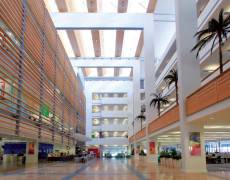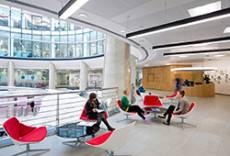July 24, 2014
The collaboration between BIFM and CIPD unites the workplace tribes
 The world of work and the workplace is always changing. We know it. You know it. In fact, there are a whole host of people that know it, but depending on what side of the professional fence you sit on, you might approach it in different ways, looking through a different lens or with a specific focus. Or are you already bridging the professional gap? Workplace change and the numerous ramifications of it are well documented. In a world that is changing, at frightening pace, it is strange to think that many of the ways in which we work are so entrenched in 20th century thinking. We need to break away from this and outline what the future is going to look like and how we should adapt. Or do we already have the answers? This ground is well trodden. However, it could be time to reassess our thinking and the way we approach this challenge, ensuring it becomes the norm for organisations around the world.
The world of work and the workplace is always changing. We know it. You know it. In fact, there are a whole host of people that know it, but depending on what side of the professional fence you sit on, you might approach it in different ways, looking through a different lens or with a specific focus. Or are you already bridging the professional gap? Workplace change and the numerous ramifications of it are well documented. In a world that is changing, at frightening pace, it is strange to think that many of the ways in which we work are so entrenched in 20th century thinking. We need to break away from this and outline what the future is going to look like and how we should adapt. Or do we already have the answers? This ground is well trodden. However, it could be time to reassess our thinking and the way we approach this challenge, ensuring it becomes the norm for organisations around the world.






 The recent Cabinet reshuffle in the UK Government won’t alter one fact; politicians simply don’t get it when it comes to technology, the workplace, the way people work and the needs of small businesses. Once you dismiss the paranoid idea that they DO get it but don’t care because they’re too busy looking out for The Man, you have to conclude that one of the big problems they have (this won’t go where you think) is that they don’t understand anything about technology and work, especially when it comes to emerging technology, the working lives of individuals, the needs and functions of small businesses and the fact the self-employed exist at all. These things exist outside the bubble. This is obviously a problem because they are implementing policies and making big, uninformed and anachronistic decisions about the things that shape every aspect of our lives, help to define us as people and determine how companies and individuals function. Here are just three examples.
The recent Cabinet reshuffle in the UK Government won’t alter one fact; politicians simply don’t get it when it comes to technology, the workplace, the way people work and the needs of small businesses. Once you dismiss the paranoid idea that they DO get it but don’t care because they’re too busy looking out for The Man, you have to conclude that one of the big problems they have (this won’t go where you think) is that they don’t understand anything about technology and work, especially when it comes to emerging technology, the working lives of individuals, the needs and functions of small businesses and the fact the self-employed exist at all. These things exist outside the bubble. This is obviously a problem because they are implementing policies and making big, uninformed and anachronistic decisions about the things that shape every aspect of our lives, help to define us as people and determine how companies and individuals function. Here are just three examples.









July 25, 2014
We may not know what the future holds, but we can certainly be prepared for it
by Justin Miller • Comment, Facilities management, Furniture, Workplace design
(more…)